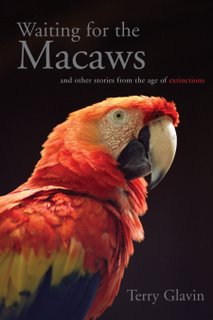Today's Globe and Mail excerpts my new book!
 It took four years, on and off, so I was happy when it arrived, let me tell you. All nice and new and shiny, with that new-book smell and everything. It’s called Waiting For The Macaws. Viking/Penguin is publishing it in Canada (you can even read the prologue here) and St. Martin’s Press is publishing it next year in the U.S.
It took four years, on and off, so I was happy when it arrived, let me tell you. All nice and new and shiny, with that new-book smell and everything. It’s called Waiting For The Macaws. Viking/Penguin is publishing it in Canada (you can even read the prologue here) and St. Martin’s Press is publishing it next year in the U.S.Started out on an Irish backroad, went to Russia, Costa Rica, Singapore, Vancouver Island, the Lofoten Islands off the Norwegian coast, the vaults underneath Kew Gardens in London, wandered out of the Eastern Himalayas into Burma (by mistake) and ended up in Calcutta.
The story is that the world is unraveling. We’re losing a language every two weeks, a venerable old food crop variety every six hours, a distinct species every ten minutes. Songs, stories, ideas – all vanishing. The odd thing about all the effort I put into the book is that I ended up admiring humanity far more than when I started.
We’re facing really hard choices now. There’s much more at stake than there was in any of the terrible choices our parents and grandparents faced. But there is absolutely no evidence that the direction the world is heading in is the direction any of us wants it to go. And the thing is, we still have the capacity to choose, to make decisions. So it’s about deciding.
Anyway, it’s mainly a book of stories: A village, a tiger, a bird, a fish, a lion, a whale, a flower, a world, a god.The fish story is The Last Giants in the River of the Black Dragon, and today's Globe excerpt is a kind of journalese version of a passage from that chapter. Here’s a snippet:
The day I arrived in Khabarovsk for a symposium on fisheries conservation, there was an article on the front page of the Pacific Ocean Star, the city's daily newspaper, about a police investigation into the assassination of the state governor. The investigators were saying that he had been killed by organized-crime bosses who had gained control of whole sections of the coastal fishing industry. But no one was certain, and nor could anyone say with any certainty who had murdered the senior fisheries-enforcement officer on Sakhalin Island. The year before, he had begun a crackdown on high-seas poaching. Some said his assassins were from a Japanese organized-crime syndicate. Others pointed to the Japanese gangs' Russian-mafia clients.
It was a mystery -- as is the extent of the "shock therapy" that the transition from communism has brought to Russia's eastern rivers and Pacific waters. Outside the country, the magnitude of what has been happening is largely unknown. . .
Private businesses ended up with almost all the forest licences and most of the region's vast mineral deposits. The forests that remained in public hands were being clear-cut by criminal outfits. Journalists who tried to report on the situation did so at the risk of their lives. Russia's Pacific fish stocks were plundered. Fishing quotas were assigned to new quasi-legal corporations that sublet their shares to foreign fleets, mainly shady Japanese enterprises that counted, as a simple cost of doing business, the lease fees they deposited into gangsters' foreign accounts.
Russian naval and coast guard forces were powerless to stop what had degenerated into a massive poaching free-for-all. The naval base at Russky Island, which lies almost within sight of Vladivostok Harbour, was cut off from its basic food supplies; more than 1,000 officers and crew had to be evacuated to the mainland to be treated for severe malnutrition. Four sailors starved to death.
It’s in the Globe’s Focus section, here.





1 Comments:
Congratulations! Thanks for sharing this wonderful news with us.
I just read your prologue and the Globe excerpt. Wonderful!
You are a truly talented, intelligent writer. I've made a note of your book, and will look for it in bookstores. I'd love to read it, as the extinction of large species - and the plight of our planet (our raping, pillaging and plundering of natural resources and destruction of wildlife habitats) - have always been of interest and grave concern to me as an environmentalist (and a human being who believes that our survival depends upon peaceful co-existence with ALL inhabitants of this planet: peoples, flora, fauna...)
I look forward to buying and reading your book soon.
Once again, congratulations! Excellent work!
(By the way, I was 'tagged' by Scott Neigh of 'A Canadian Lefty in Occupied Land' a couple of days ago. I answered the requisite four questions on my blog. In turn, I had to 'tag' four other bloggers. One of them was you. Sorry! It's just that I like your blog, and couldn't think of too many people I'd like to know a bit more about... :) You don't have to bother with it if you'd rather not. This was my first time, and I really don't know what the point is other than perhaps getting to know our fellow bloggers a tad better... )
Take care. I'll let you know when I 've bought and started reading your book.
Cheers and
Peace~
Annamarie Deneen
verbena-19
Post a Comment
<< Home